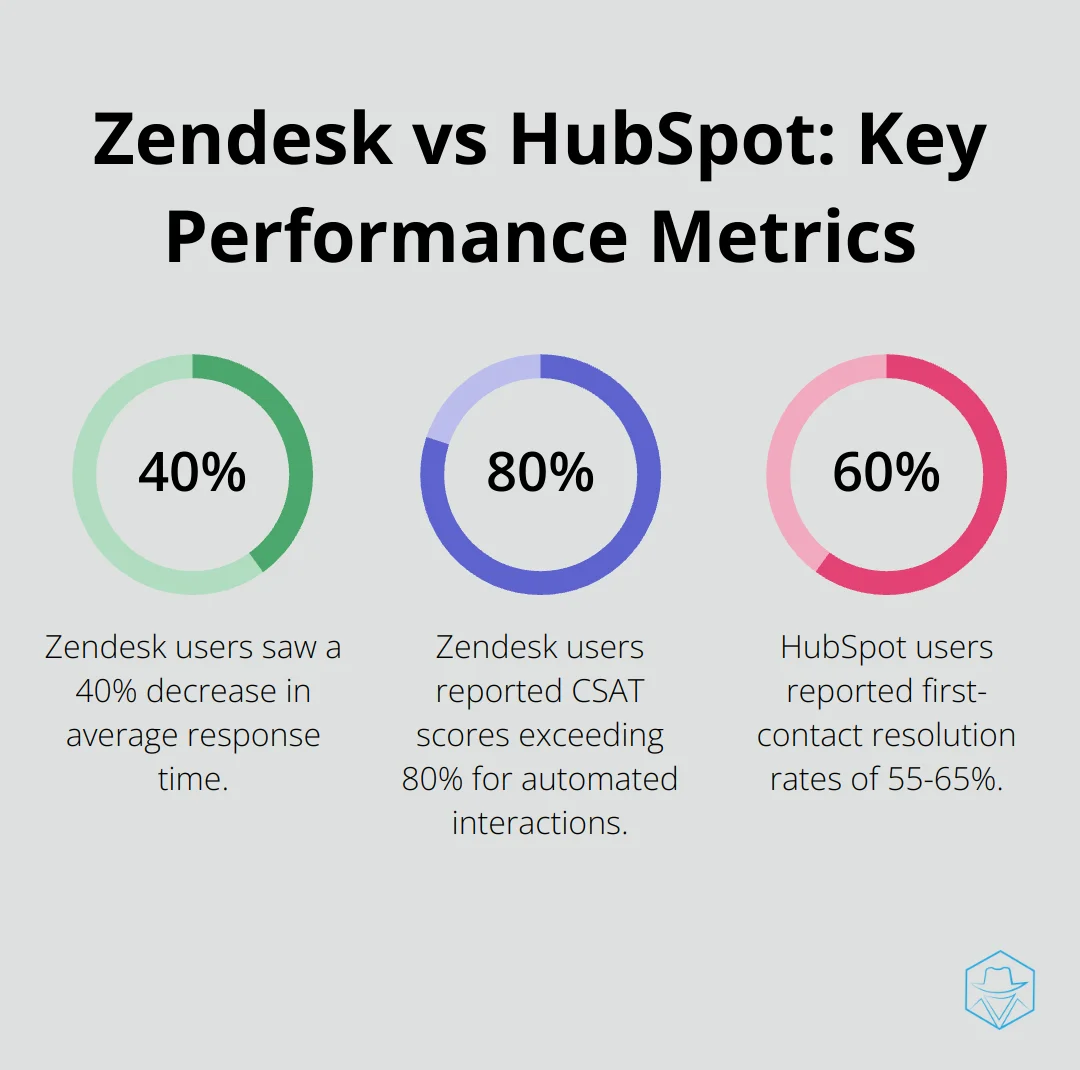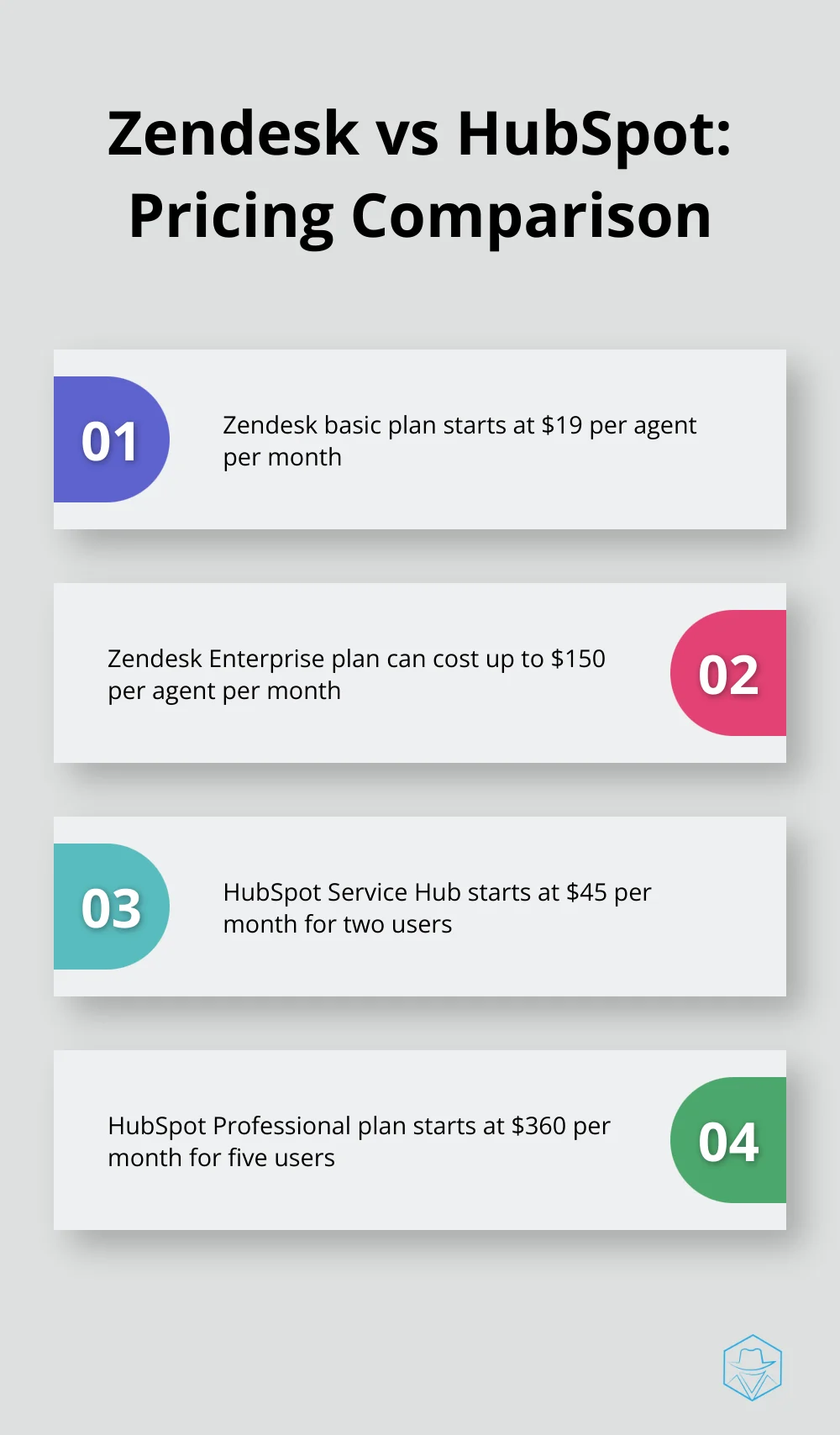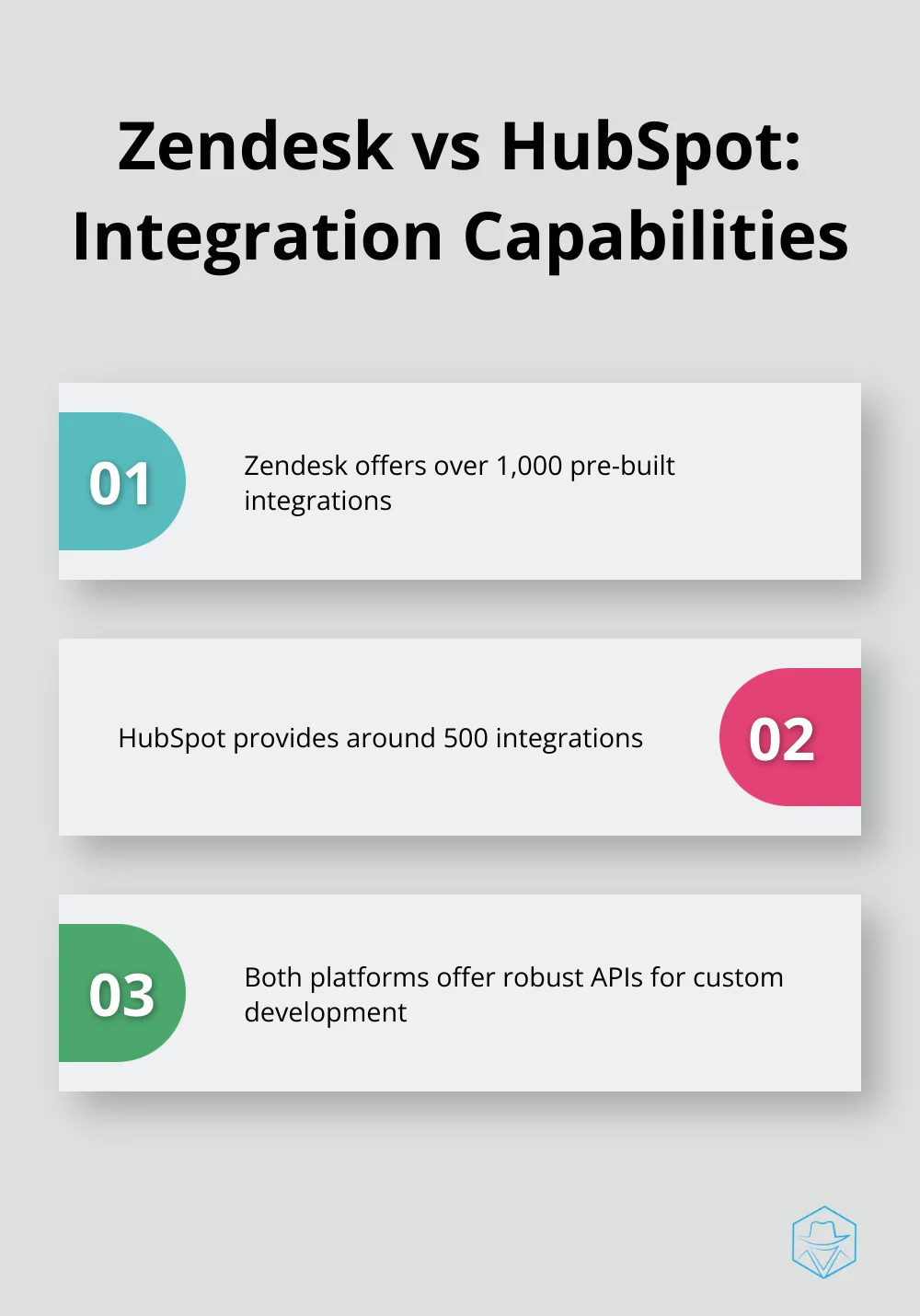Zendesk vs HubSpot: Customer Service Software Showdown

At Drop Cowboy, we understand the importance of choosing the right customer service software for your business.
In this blog post, we’ll compare two industry giants: Zendesk vs HubSpot.
We’ll examine their key features, pricing structures, integration capabilities, and overall suitability for different business needs.
Which Platform Offers Better Features?
At Drop Cowboy, we have examined the key features of both Zendesk and HubSpot to help you make an informed decision. Let’s explore the specifics of what each platform offers.
Ticketing and Customer Support Management
Zendesk excels in this area with its robust ticketing system. It efficiently manages and routes customer queries, ensuring they reach the right agent. The platform’s customizable workflows allow businesses to automate repetitive tasks, which saves time and reduces human error. A Forrester Consulting study found that companies using Zendesk’s AI-powered ticketing system reported a 40% decrease in average response time.
HubSpot’s ticketing system, while not as advanced as Zendesk’s, integrates seamlessly with its CRM. This integration provides agents with a comprehensive view of customer interactions across sales and marketing channels. HubSpot users have reported first-contact resolution rates of 55-65% (which can improve further with customizations).
Live Chat and Messaging Capabilities
Both platforms offer strong live chat functionalities, but Zendesk takes the lead with its advanced chat features and multi-channel integration. Zendesk supports email, social media, and voice channels from a single dashboard. This unified approach has led to improved customer satisfaction rates, with some businesses reporting CSAT scores exceeding 80% for automated interactions.
HubSpot’s live chat is part of its all-in-one system, which integrates marketing, sales, and service. While it may not have as many advanced features as Zendesk, it excels in data-driven personalization by utilizing complete customer interaction histories from its integrated CRM.

Knowledge Base and Self-Service Options
Zendesk’s knowledge base uses Elasticsearch, providing high-performance search capabilities. This allows customers to find answers quickly, which reduces the load on support teams. Zendesk users have reported first-contact resolution rates of 60-70% with automated channels, significantly improving operational effectiveness.
HubSpot’s knowledge base is part of its comprehensive content management system. It allows for organized, quick access to customer support resources. The platform’s drag-and-drop capabilities for easy web page creation benefit businesses seeking to enhance their online presence and self-service options.
Reporting and Analytics Tools
Zendesk offers comprehensive reporting tools that allow businesses to analyze customer interactions and improve services. Its AI capabilities focus on natural language processing and sentiment analysis, helping to efficiently route tickets to the right agents.
HubSpot leverages CRM data for predictive analytics, enabling resource forecasting and specialized ticket assignments. Its all-in-one system provides a unified view of customer interactions across marketing, sales, and service departments, allowing for more comprehensive analysis.
While both platforms offer strong features, the choice between Zendesk and HubSpot ultimately depends on your specific business needs. For businesses primarily focused on customer support, Zendesk’s advanced ticketing and multi-channel support might be the better choice. For those looking for an integrated CRM solution with strong marketing capabilities, HubSpot could be the way to go.
Now that we’ve compared the features of these two popular platforms, let’s move on to examine their pricing structures and how they stack up in terms of cost-effectiveness for different business sizes.
How Much Will You Pay for Customer Service Software?
At Drop Cowboy, we know that pricing plays a significant role in choosing between Zendesk and HubSpot. Let’s examine the pricing structures of both platforms and their cost-effectiveness for various business sizes.
Zendesk’s Pricing Model
Zendesk uses a tiered pricing structure to cater to different business needs. Their pricing begins at $19 per agent per month for the basic plan, which includes essential ticketing features. However, costs can increase substantially as you add more advanced features or scale up your team.
For larger businesses or those requiring comprehensive solutions, Zendesk’s pricing becomes more complex. The Enterprise plan, which includes advanced workflow and AI capabilities, can cost up to $150 per agent per month. It’s important to note that Zendesk’s seat-based charges can result in significant cost increases as your team expands.
HubSpot’s Pricing Approach
HubSpot takes a different route with its pricing strategy. They offer a freemium model for their basic CRM and service features, which can appeal to small businesses or those new to customer service software.
For more advanced features, HubSpot’s Service Hub starts at $45 per month for two users, with prices increasing as you add more users or upgrade to higher-tier plans. The Professional plan, which includes more advanced automation and reporting features, starts at $360 per month for five users.

Cost-Effectiveness for Different Business Sizes
Small businesses or startups may find HubSpot’s freemium model and lower-tier plans provide excellent value. The ability to start with basic features and upgrade as needed makes it a flexible option for growing companies.
Zendesk might prove more cost-effective for medium to large businesses that require advanced ticketing and multi-channel support capabilities. Despite higher upfront costs, the efficiency gains from Zendesk’s robust features can lead to significant savings over time.
Hidden Costs and Add-ons
When evaluating either platform, it’s essential to consider potential hidden costs. Both Zendesk and HubSpot offer various add-ons and integrations that can enhance functionality but also increase your overall spend.
For Zendesk, features like advanced analytics, AI-powered bots, and certain integrations may incur additional costs. HubSpot users might need to upgrade to higher-tier plans to access certain advanced features or to remove usage limits.
Implementation and training costs also warrant consideration. While both platforms strive for user-friendliness, there may be a learning curve (especially for more complex setups).
Comparing Value with Drop Cowboy
While Zendesk and HubSpot offer robust features, businesses should also consider Drop Cowboy as a cost-effective alternative. Drop Cowboy’s pricing model only charges for successful deliveries, potentially offering significant savings compared to seat-based or tiered pricing structures.
As we move forward, let’s explore how these platforms stack up in terms of integration and customization capabilities, which can significantly impact the overall value and effectiveness of your customer service software investment.
How Flexible Are Zendesk and HubSpot?
At Drop Cowboy, we understand that flexibility and scalability are important factors when choosing customer service software. Let’s explore how Zendesk and HubSpot measure up in terms of integration, customization, and adaptability to growing business needs.
Integration Capabilities
Zendesk offers over 1,000 pre-built integrations, which allows businesses to connect their existing tools seamlessly. This extensive marketplace includes popular services like Salesforce, Shopify, and Slack. The Zendesk-Salesforce integration enables support teams to access customer data from both platforms, which enhances the quality of customer interactions.
HubSpot provides fewer integrations (around 500) but focuses on quality over quantity. Its native integrations with marketing and sales tools provide a more cohesive experience for businesses using the entire HubSpot ecosystem. A standout feature is HubSpot’s integration with social media platforms, which allows teams to manage customer interactions across multiple channels from a single interface.

API and Custom Development
Both platforms offer robust APIs for custom development. Zendesk’s API is known for its flexibility, which allows developers to create custom apps and integrations tailored to specific business needs. This has led to the creation of unique solutions (like automated ticket routing based on complex business rules).
HubSpot’s API, while less extensive, is well-documented and user-friendly. It’s particularly useful for businesses looking to integrate HubSpot with their proprietary systems. For example, an e-commerce company used HubSpot’s API to create a custom integration that automatically creates support tickets from order data, which streamlines their customer service process.
Ease of Setup and Implementation
Zendesk’s setup process can be more complex due to its extensive feature set. However, they offer a range of resources including guided setup, video tutorials, and a comprehensive knowledge base to assist users. Companies like Uber have reported successful implementation of Zendesk across large teams, citing the platform’s flexibility as a key factor.
HubSpot, true to its user-friendly reputation, offers a more straightforward setup process. Their onboarding wizard guides users through the initial setup, which makes it easier for smaller teams or those new to CRM systems to get started quickly. However, for more complex use cases, professional services may be required to fully leverage HubSpot’s capabilities.
Scalability for Growing Businesses
Zendesk excels in terms of scalability, especially for businesses with complex support needs. Its modular approach allows companies to add features as they grow, without overhauling their entire system. This scalability has made Zendesk a popular choice among rapidly growing startups and established enterprises alike.
HubSpot’s scalability is closely tied to its all-in-one approach. As businesses grow, they can easily upgrade to more advanced plans or add additional hubs (Marketing, Sales, Service) to their existing setup. This integrated growth path can be particularly beneficial for companies looking to align their customer service with marketing and sales efforts as they scale.
Final Thoughts
Zendesk and HubSpot offer robust customer service solutions with distinct strengths. Zendesk excels in advanced ticketing, multi-channel support, and scalability for complex needs. HubSpot shines with its all-in-one approach, integrating customer service with marketing and sales functionalities.
The choice between Zendesk vs HubSpot depends on specific business requirements. Zendesk suits companies prioritizing advanced support features, while HubSpot fits those seeking an integrated CRM approach. Both platforms have their merits, but businesses should assess their current needs and future goals before deciding.
Alternative solutions might better suit specific needs. Drop Cowboy provides unique customer communication features (including ringless voicemail and SMS capabilities). Its pay-per-successful-delivery model could offer cost savings compared to seat-based pricing structures.
blog-dropcowboy-com
Related posts

March 6, 2025
Text Message Marketing Statistics You Should Know
Explore text message marketing statistics to boost engagement and conversion rates effectively. Learn how SMS drives customer interaction.

May 27, 2025
Best Alternatives to TCN: How to Choose the Right Call Center Platform
Explore top alternatives to TCN and find the best call center platform to boost efficiency and meet your business needs effectively.

August 4, 2025
Why does my phone go directly to voicemail
Explore why your phone goes directly to voicemail. Uncover causes like Do Not Disturb, network issues, and battery problems for quick solutions.

April 24, 2025
Marketing Automation Consultancy: Services and Benefits
Discover how marketing automation consultancy boosts efficiency, cuts costs, and maximizes ROI. Learn about key services and their benefits today.

June 2, 2025
Are Ads on Google Maps Effective for Local Businesses?
Boost local visibility! Learn if ads on Google Maps can drive customers to your business and enhance local engagement effectively.

May 27, 2025
E-leads CRM: Boost Your Sales with Efficient Lead Management
Boost sales with E-Leads CRM for effective lead management, streamline processes, and maximize conversions with proven strategies.